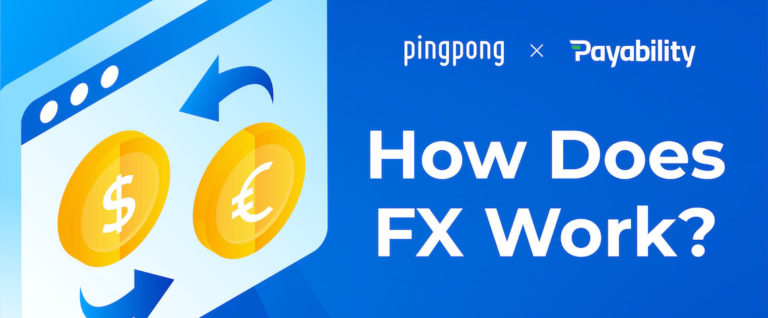In this article we will explore:
- All things FX: How it works and why it should matter to you
- Amazon’s new Payment Service Provider Program & FX
- What is a Payment Service Provider?
- The Benefits of Using a PSP for Currency Exchange
What is FX?
Most simply put, Forex, also known as foreign exchange (FX), is the conversion of one currency into another. This typically comes with costs.
As an online merchant, FX applies any time a foreign currency is converted into your domestic currency. For example, a US based seller conducting business on an international marketplace (like Amazon: examples) receives sales profits in euro. By the time those profits are deposited into your bank account in your domestic currency (USD), FX occurred.
In this article we will be examining foreign currency exchange and exploring solutions for optimizing handling currency exchange to boost your bottom line.
Who is Impacted – and How?
Over an estimated two billion people made an online purchase by the end of 2020.
Online sales have shifted. As important as the U.S. market is to this growth through marketplaces such as Amazon, eBay, and Etsy – 85 percent of the industry purchasing power lies abroad.
Expansion into international markets is a no-brainer for any serious online seller, and ultimately inevitable if growth or scale are a part of your business plan.
Online eCommerce sellers trading cross-border, from large, multinational corporations and individuals to small and medium-sized enterprises – all of those companies trading globally, sending and receiving payments in foreign currencies that require international bank accounts, etc., are impacted by FX.
Entities conducting global business have to also consider dealing in foreign languages and multiple currencies, as well as duties, tariffs, and FX.
Check it out: Some of the most frequently traded FOREX pairs are the euro versus the US dollar (EUR/USD), the British pound against the euro (GBP/EUR), and the British pound versus the US dollar (GBP/USD).
Following a year of uncertainty, the global marketplace has become one of the very few resilient, effective, and profitable platforms to weather the storm.
The global eCommerce market has reached more than $1 trillion, and forecasts anticipate this trend continuing.
If selling overseas, you’ll inevitably start receiving payments in foreign currencies.
The default, if you’re selling on marketplaces, is for the marketplace to deal with those payments for you. With more and more cross-border business being conducted, some marketplaces are implementing changes and programs to further protect customers – and themselves.
FX & Amazon’s New Payment Service Providers (PSP) Program
Recently, Amazon launched a new program that impacts how sellers receive earnings from their Amazon sales.
The Payment Service Provider Program is an innovative approach by Amazon to enhance its ability to detect, prevent, and take actions against bad actors to further protect customers and sellers from fraud and abuse.
PSPs participating in this new program are required by Amazon to have appropriate risk and compliance controls in place – further ensuring the safety of your money. Sellers who use a third-party payment service provider (PSP) will be limited to those participating in its new program.
However, many merchants choose to have their sales profits deposited directly into their bank accounts but did you know…
Currency conversion rates are typically high. Many consumers aren’t aware that banks charge 3-5% for currency conversion. Going one step beyond the difference in exchange rates between the external currency converter and the retail conversion rates, customers are often unaware that banks also charge a foreign currency fee. Typically, a card issuer or bank will charge a fee of around 3-5% for purchases made in a foreign currency, which won’t be revealed by the currency converter.
Marketplace platforms don’t necessarily have your back any better than banks do when it comes to currency exchange rates. Offered rates are normally high (typically 2.5% more than payments solutions like OFX) and frequently charge a commission fee.
Take Amazon, for example. An additional 3.5% is added to the Amazon selling fee (depending on the category – can be as much as 30%!), and if you’re also using Fulfillment By Amazon (FBA) you may be giving more of your hard-earned profits to the marketplace than you’re aware of.
What is a PSP?
Converting funds into your home country’s currency can be expensive – not to mention other services required to facilitate cross-border trade.
Cross-border payment solutions help sellers manage overseas logistics, pay suppliers in a local currency, and make VAT payments in real-time.
Different PSPs offer different products that can positively affect a seller’s business and revenue. Here are some of the solutions different PSPs offer that help eCommerce sellers manage their business, save money and bank more revenue. Here’s what PingPong has to offer:
Avoiding Hidden FX Fees on Amazon (and Other Marketplaces!)
Sellers who are opting to have their marketplace profits deposited directly to their bank accounts are also opting to have marketplaces handle their FX conversion on their behalf – likely without knowing how much revenue is being lost in hidden fees.
Utilizing a payment service provider can help you keep more of your revenue and sales profits that you’re likely paying banks and marketplaces in hidden FX fees. Most notably, a third-party payments solution is charging a fraction of what banks and marketplaces charge to essentially deposit your earnings directly to your bank account.
FX & Supplier Payments – More Ways to Save
If you’re sourcing inventory from overseas, then you could also benefit from utilizing a comprehensive payments service provider.
They can help you process your payments to your suppliers overseas to ensure a superior exchange rate. You can even pay your suppliers in their home currency – giving you more bargaining power when it comes to FX and other fees suppliers might charge. This means you pay for your inventory at reduced rates – resulting in additional boosts to profit margins.
Foreign exchange isn’t usually top of mind for most sellers when considering ways to save big. However, making a few simple, small changes to the way your funds are managed can make a huge difference to your bottom line and ultimately improve your profit margins.
Hundreds of thousands of dollars in currency exchange savings could potentially be left on the table (from an annual perspective) – a mistake that can be avoided when working with a PSP.
Unique Local Accounts & FX Savings
PingPong (a participant in Amazon’s new PSP program) gives sellers unique (to the seller) account numbers for each country they do business in, facilitating global online selling — under one comprehensive, easy-to-use platform.
By setting up a PingPong global currency account, an online merchant can send payments and receive payouts from foreign marketplaces like Amazon UK, Amazon Canada, Amazon EU, Amazon Japan, Amazon Australia, Rakuten, Wish, Shopify, and so many more.
You can set it up so that your marketplace pays into your PingPong account, and then you can withdraw those earnings into your personal bank account in your local currency at a more attractive exchange rate than banks and marketplaces can generally offer.
This means that you get more money than you would using a bank or marketplace rate.
Conclusion
When it comes to foreign exchange, merchants should be analyzing their business needs. More often than not, utilizing a payments solution service as part of your FX strategy is likely to rake in savings of hundreds to potentially thousands every month in FX alone.
Find out why over 750,000 eCommerce merchants around the world trust PingPong to save them money on cross-border payments, VAT payments, supplier payments, and more.


